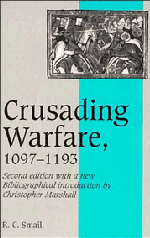Book contents
- Frontmatter
- Contents
- List of plates
- List of maps
- List of plans
- Preface (1954)
- List of abbreviations
- Bibliographical introduction (1994)
- I The historians of crusading warfare
- II Warfare and policy in Latin Syria
- III Franks, Armenians, and Syrians
- IV The Muslim armies
- V The Latin armies
- VI The Latin field army in action
- VII The Crusaders' castles
- Bibliography
- Bibliography to the second edition
- Index
- Plate section
IV - The Muslim armies
Published online by Cambridge University Press: 29 September 2009
- Frontmatter
- Contents
- List of plates
- List of maps
- List of plans
- Preface (1954)
- List of abbreviations
- Bibliographical introduction (1994)
- I The historians of crusading warfare
- II Warfare and policy in Latin Syria
- III Franks, Armenians, and Syrians
- IV The Muslim armies
- V The Latin armies
- VI The Latin field army in action
- VII The Crusaders' castles
- Bibliography
- Bibliography to the second edition
- Index
- Plate section
Summary
SALJUQ INSTITUTIONS
The valleys of the Euphrates and the Nile have each been the seat of empire, and Syria, as a bridge between the two, has many times in history been invaded from both. In the twelfth century the power on the Euphrates was the Abbasid caliphate, in which since 1059 the Saljuq sultans had exercised temporal power; that on the Nile was the Fatimid caliphate which had been established in Egypt since the year 969. During the twelfth century both were from time to time involved in war with the Franks, whose military methods were affected by the organization and tactics of the armies sent against them. Those attributes of the Muslim armies which appear to have influenced the Franks are the subject of this chapter.
It is a commonplace that the success of the First Crusade was primarily due to division among the Saljuq Turks. The age of their great sultans, Tughril Beg, Alp Arslan, and Malik Shah had ended with the death of the last named in 1092. Thereafter not only did the dynasty fail to produce a personality equal to that of the great sultans, but their energies were largely absorbed by succession disputes and consequent civil war. In such conditions the control which the sultans could exercise over the institutions of government was weakened. This particularly applied to the administration of those provinces which had been granted as a form of iqta' to the great amirs.
- Type
- Chapter
- Information
- Crusading Warfare, 1097–1193 , pp. 64 - 87Publisher: Cambridge University PressPrint publication year: 1994



